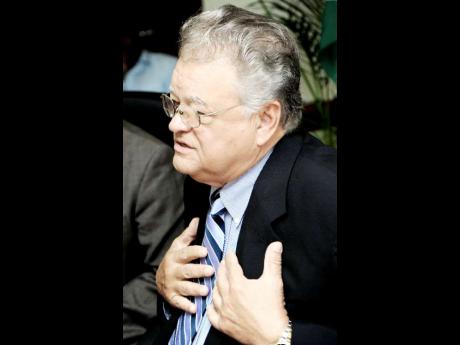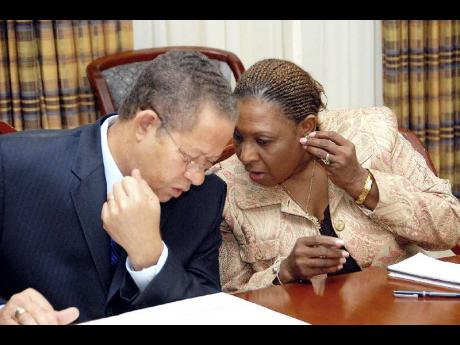Old forces, new alignments
Robert Buddan, Contributor
Bruce Golding has conceded to a commission of enquiry into the Golding-Coke-Brady-Manatt affair, now over a year old. We are yet to see how independent that enquiry will be. We might also wonder who he is conceding to, and why. He might be using the longstanding People's National Party (PNP) demand for a commission of enquiry to conceal the real motive.
That motive might be to appease the forces that threaten to split the party openly and seriously disrupt its November conference if the party does not enquire into who must take what responsibility for the terrible miscalculations that took place. It might be that an orderly conference is necessary to keep financial donors interested in the party. This becomes even more important after the huge success of the just-concluded PNP conference.
For some 15 years, between the JLP's defeat in 1989 and Bruce Golding's final ascendancy to the party's leadership, the party had been badly divided by intrigue and distrust. It was, nonetheless, able to subdue its dissenters for the two years preceding the 2007 elections. Its supporters must have hoped that the worse had passed. Big money might have thought it had patched up the wounds. An election victory then seemed to make everyone happy. But in just the third year of the party's government, fissures and outright factional infighting started again. The Golding-Coke-Brady-Manatt imbroglio has brought the old forces in their old and new alignments to head again.
What appeared not to have happened in those 15-plus years is the emergence of a leader around which the party could genuinely unite. It was not to be Mike Henry, Pearnel Charles or Audley Shaw. Though he had failed to keep the National Democratic Movement (NDM) united, his backers still thought Bruce Golding would be the man. But he has turned out to be very divisive and destructive of the party's reputation. He has made terrible mistakes, failed to speak the truth, failed to take responsibility and has tried to pass blame on to others around him.
Class leadership
The JLP was strongest under its labour leaders, Bustamante and Shearer. They were closer to the working people. They fought alongside those people through their trade unions. But the party's middle- and upper-class leadership since has shown a sorry lack of leadership ability. They have not been democratic in their leadership. They have lacked discipline. They have failed to subject themselves to the same laws and standards of politics they expect citizens to respect. The Carl Stone poll of May 1990 showed that Hugh Shearer was the person Jamaicans most preferred to take over from Seaga, followed by Pearnel Charles.
Class-based indiscipline
But the upper classes did not accept this and class-based indiscipline has continued to haunt the party since. It is not just Golding's indiscipline. It is an entire class that overlaps with the party. This is a class that likes to chasten the lower class for lack of discipline and for immorality. It is not just political indiscipline, because none of the local governments, PNP or JLP, which represent the less-wealthy and connected politicians, have demonstrated the indiscipline towards law and morality the way those with power and privilege from the middle and upper classes at the top levels of party and government have.
Reform
Without the discipline to respect a fair and open process, reformism will descend into personal and factional fighting, losing its higher cause. It simply becomes high intrigue among the upper echelons of the political class. This is what has happened in the JLP over those 15 or so years.
The Gang of Five represented the first phase of reform (1990-95). Karl Samuda, Pearnel Charles, Edmund Bartlett, the late Errol Anderson and Douglas Vaz, father of Daryl Vaz, made up the five. But if they had a clear vision of reform, it was lost in the personal quarrels that followed. Dissent widened by 1995 to include the 'Western Eleven', mainly from the western parishes. Its reform programme was also lost in the war of words that clouded the issues. Their complaint was both about Edward Seaga's unfortunate style and about party democracy.
The second phase of reform (1995-1997) was more genuine, but Bruce Golding's commitment to it was uncertain. The reform movement had been forced out of the JLP. In 1995, the NDM was formed, mainly by Western Eleven JLP dissidents.
As one member recently remembered, "Bruce Golding was invited to become the leader because it was thought that he would give the movement the traction it needed. However, that was a mistake made on the part of the people who formed the party. When Mr Golding was first asked, I was reliably informed that they were instructed to leave his house. He was the one who had asked, after some time had passed, if the movement still wanted him to take up leadership. This was after he had broken ties with Mr Edward Seaga." Golding did not form the NDM. He did not want to be a part of it. He chased its representatives from his house. Only when his situation became untenable in the JLP, and he needed a party to cushion his career, did he ask the NDM if they still wanted him.
The third phase of reform began when Golding re-entered the JLP in 2002. It was an ugly re-entry. It showed promise through his "one hand can't clap" speech in February 2005. But the ugly side was already apparent in the April 2004, Sunday Herald story, 'Strife rocks JLP camp'. There was division between so-called traditionalists and reformists. Once again, the reform agenda got lost in the infighting.
Samuda was trying to get new deputy leaders, Horace Chang and James Robertson, and members of the secretariat, Don Creary and Aundré Franklin, to have more say to balance the power of the old guard. Peralto and Olivia Grange, traditional loyalists of Seaga, resisted.
Appeasing opponents
Golding's crowning as prime minister in 2007 was expected to signal the occasion to try reforms again. Yet he did little to reform either the party or the political system. Instead, Golding has played to all the old political styles and forms. His abuse of power, privilege and trust has brought the party to a place that, after 20 years, it had never really left.
The commission of enquiry is not about reform. It is about appeasing opposing forces - at least until after the November conference has passed. The jockeying for positions is not about reform either. G2K says it is about age and new leadership. That doesn't explain why it is backing Daryl Vaz instead of Franklin. The Golding-Brady division is not about reform. It is about Brady's reputation. Karl Samuda, who was there in 1990, and is there now, is apparently being muscled out. Will all those years as matador, as he called himself, come to nothing?
Robert Buddan lectures in the Department of Government, UWI, Mona. Email: Robert.Buddan@uwimona.edu.jm.


